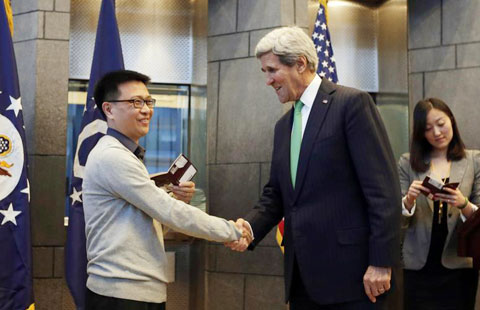Mediation underway to end strike by cabbies
Updated: 2014-11-14 08:07
By Zheng Caixiong in Guangzhou(China Daily)
|
||||||||
Traffic, police and labor departments in Shaoguan, Guangdong province, are busy mediating in a strike by taxi drivers objecting to a proposed increase in their monthly contract fees.
Tang Mingqiang, deputy director of the Shaoguan Bureau of Communications, said the departments and the taxi companies are studying drivers' demands in an attempt to heal the rift.
"Drivers should end the strike and resume work first because the strike has tarnished the city's image," Tang said at a news conference in Shaoguan on Wednesday.
"The traffic, police and labor departments have promised to try to find a figure acceptable to the taxi drivers and their employers and will protect drivers' legal rights and interests according to laws and regulations," he said.
The strike, which began on October 30 has damaged Shaoguan's reputation and caused many travel difficulties for residents and tourists.
It started after taxi companies announced a rise in the monthly contract fees for a cab from 6,700 yuan ($1,095) to about 7,000 yuan a month, starting this Saturday.
The rise in fees could mean drivers having to pay more than 10,000 yuan each month to operate a cab.
"In addition to the increased contract fees, we still have to face price rises for gas and gasoline, the cost of wear and tear to the cab and related expenses," said a taxi driver surnamed Chen.
"We can hardly earn enough to support our families, and the contract fees continue to rise," Chen told local media.
"Many taxi drivers can only earn about 2,000 yuan a month after they have paid the contract fees and related expenses," he said.
"It would be acceptable if the monthly contract fees are cut to 5,000 yuan a month," he added.
Another taxi driver, surnamed Huang, said he cannot accept any increase in the contract fees because they are too high.
"The environment for operating a cab is very poor in Shaoguan because the city's taxi drivers have to compete against the large number of unlicensed vehicles that are illegally used as cabs," Huang said.
"The strike will not end unless our demands are met," he said.
Lai Zhengbiao, deputy manager of the Shaoguan Yueyun Taxi Company, said his firm promised to reduce the monthly contract fees by 950 yuan a month after the strike started.
"But there is still a large disparity between taxi companies and drivers, and the taxi companies also have their own difficulties in further reducing the fees for the contractors and drivers," he said.
About 570 cabs from six taxi companies are registered in Shaoguan, including 400 gas and gasoline vehicles and 100 electric ones.
After the 400 drivers of gas and gasoline vehicles went on strike, only the 100 electric taxis are still operating.
Zheng Da, a commentator with Guangdong Television Station, said the traffic, police and labor departments should have taken effective measures to prevent the strike from taking place because the drivers expressed their grievances and demands several months before the strike began.
Peng Peng, a senior researcher at the Guangzhou Academy of Social Sciences, said the government should also make efforts to combat illegal and unlicensed cabs in an effort to protect interests of official cab drivers.
Zhou Chutian contributed to this story.
zhengcaixiong@chinadaily.com.cn
- Britain to introduce tough new foreign fighter laws
- World's tallest man meets world's shortest man
- Lang Lang honored with German award
- Rituals and prayers for hope at the South Korean college entrance exams
- Afghan president arrives in Pakistan for key security talks
- DPRK to send special envoy to Russia

 Premier Li pledges to strengthen cooperation with India
Premier Li pledges to strengthen cooperation with India
 Lang Lang honored with German award
Lang Lang honored with German award
 Airshow China soars to success in Zhuhai
Airshow China soars to success in Zhuhai
 The most people dine on the beds
The most people dine on the beds
 Dangling workers rescued from World Trade Center
Dangling workers rescued from World Trade Center
 Long-term visas issued for China, US citizens
Long-term visas issued for China, US citizens
 Long-term visas issued for China, US citizens
Long-term visas issued for China, US citizens
 Culture Insider: Chic items in ancient China
Culture Insider: Chic items in ancient China
Most Viewed
Editor's Picks

|

|

|

|

|

|
Today's Top News
US spying scheme targets Americans' cellphones
The Waldorf's hefty price tag
China, US to build milk-powder plant in Kansas
China, ASEAN set goal for upgrading FTA
Country pushes for code at South China Sea
Beijing wants to keep 'APEC blue'
US, China reach landmark pacts
Youth urged to get politically involved
US Weekly

|

|







